|
It's the last blog day of July so let's take a break from pebbling and mosaic to talk about books. It's interesting that my two favorite books this month are the first and last. They are listed here in the order I read them because I write the reviews in a draft post right after finishing each book. Otherwise, I'd forget what I wanted to say about them. There was a sufficient amount of mediocre writing this month but nothing that I absolutely hated. But if I could only give one recommendation it would be this first book. Don't forget to leave your book recommendations in the comments and you are welcome to offer a differing opinion on any of my reviews. 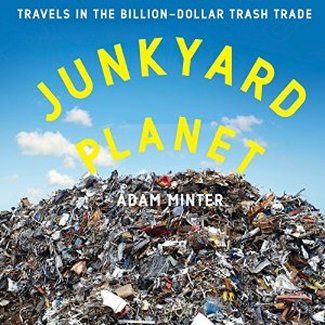 Junkyard Planet by Adam Minter If you can tolerate non-fiction books at all please read this one. Adam Minter grew up in the scrap business and later became a journalist who writes about environmental issues. The way we deal with our garbage is is passion. I know that sounds weird, but it's true. You will learn so much about how trash is gathered, sorted, recycled, reused or dumped in a landfill and, in the end, you will be a much better consumer and dumper. We think that filling our recycle bins every week will "save the planet". While it's a fine effort it's pales in comparison to recycling old cars, appliances, electronics and Christmas Tree lights. Yes, Christmas tree light recycling is big business. Underlying it (and everything else in the world) is money and labor costs. This book would be a great book for high school students to learn about economics, environmental issues and the importance of engineering all in one place. 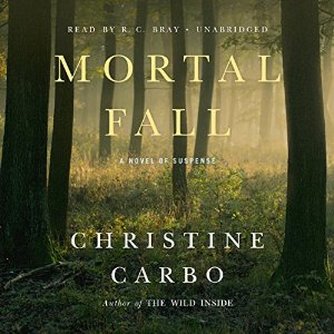 Mortal Fall by Christine Carbo In May I read The Wild Inside, the first in her Glacier national park series. Well, I think it's a series. This one was definitely a follow up to The Wild Inside because it references that story and the main character is in both. The problem is that the main character in this one is not Ted Systead. Instead it's about Monty Harris, the park police officer that helped him in the first book. Now Monty has been to a "few investigative refresher courses" and fancies himself an ace detective. He's incredibly self-important and, frankly, clueless. Fortunately, his "intuition" sends him in the right direction to help him solve the case. You will be very impressed at the the level of deep thinking he can do in stressed situations. (Sarcasm alert!) This book includes every modern PC talking point available: neo-Nazi, endangered species, global warming, mental issues and Neanderthal men. They aren't necessary at all to the plot of the novel so it comes across as just so much propaganda. Please pass this one up if you see it at your library. 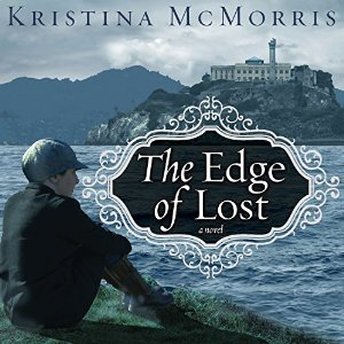 The Edge of Lost by Kristina McMorris Do you like Kate Morton? If so I think you will love this. I expected this to be a light read but found myself completely immersed in the story and wanting to meet the characters. It opens in Alcatraz in 1937 in the middle of an escape attempt. We are immediately taken back almost 20 years to Dublin where a young boy dreaming of coming to America. 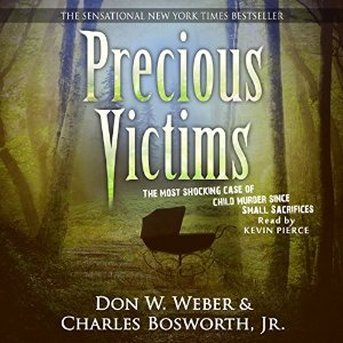 Precious Victims by Don Weber and Charles Bosworth, Jr. Well, this one isn't for everyone. It's a true crime story about Paula Sims who was arrested in the late 1980's for murdering her infant daughter...after being suspected of murdering another daughter 3 years earlier. Do you watch Discovery ID frequently? If so, you will "enjoy" the book. You can Google Paula Sims if you want the quick story but if you want to know the details of how these investigations were run and how the prosecution case was put together, then you will want to read this. It wasn't boring at all but you have to avoid getting emotionally into the story because Paula and her husband are vile people. 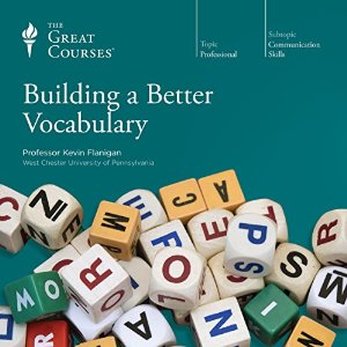 Building a Better Vocabulary The Great Courses Professor Kevin Flanigan Weeeellllllll, I got this book because my husband has a massive vocabulary, making me and my Bassett education feel inferior, and I thought this would be interesting. It truly was. Outside of teaching lots of vocabulary words, the value in this book is in the methods that he introduces for learning and retaining new words. It presents a profusion of words and you will need to treat it as a course, taking lessons incrementally to remember the new words. He goes through the lessons teaching words in related groups. Many of them, like Procrustean, are words you would never use unless you are actually trying to be a pilgarlic. But it was fun to learn even the useless words, especially the entymology. If I had children I'd do the book as a family with a lesson a week. Honestly, it could be fun. Taking the lessons metered, instead of all at once, would make a couple of his habits much less annoying. He over-emotes words like "weeeeelllllll", "soooooooo", "becaaaaaauuuuse" and at the end of each lesson he give some situations for the words but he pronounces it as "siduation" and that drove me batty. But it's still a great book. 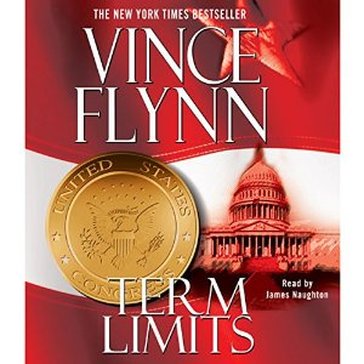 Term Limits By Vince Flynn There's a word that I learned in the vocabulary book that I thought I'd never use but it kept coming to mind as I read this book. I kept thinking that this book is agitprop for the Special Forces. Several members of congress have been murdered over the budget legislation (I kid not) and they are making demands on the President and remaining members of congress to fix the budget or more will die. I love Vince Flynn and especially the Mitch Rapp character. I'm not sure when this was written but it's pre-Mitch but does introduce some of the characters, like Irene Kennedy, from the Rapp series. Yes, most books are a lot of fantasy and you have to let go and flow with the story. But I do not accept that a member of the press knows exactly what's happening and who is doing it and stays quiet about it FOREVER. It's ludicrous. I like the word ludicrous. I knew it but didn't use it much. I'm going to use it more often thanks to the vocabulary book. 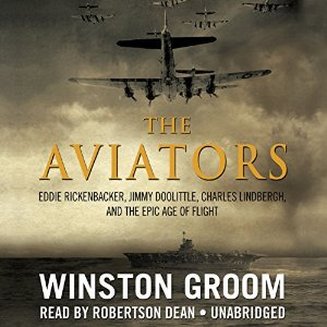 The Aviators by Winston Groom Term Limits gave me a good break from the cerebral vocabulary study but, after reading it, I was ready for serious again. The Aviators was the right choice because it didn't require studying. It only required the ability to be amazed. The Aviators are Eddie Rickenbacker, Jimmy Doolittle and Charles Lindbergh. We've all heard their names and know some of their stories but this book fills in all of the gaps. The book tells the life stories of all three me. They don't necessarily overlap, although they all served in WWII, but you get a sense for the unique contributions of each and how they contributed to the great technical advances in flight and the edge it gave the Allies to win the war. This is how I like to study history, through the individuals that are remembered as key contributors. If you like reading history, you will enjoy this book and these men. 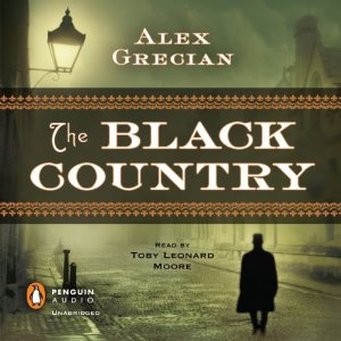 The Black Country By Alex Grecian This is the second book in "The Murder Squad" series about Scotland yard detective in Victorian England. I read the first one, The Yard, 2 months ago. I liked that one well enough but I'm not as enthusiastic about this one. Detectives Day and Hammersmith, along with Dr. Kingsley are sent to the Midlands, aka Black Country because of the coal industry, to investigate a case of a missing family. The story is quite disjointed. No one in town will talk. Is it because they are superstitious (because it's always fun to throw in a superstition storyline) or sick. The whole town is built on top of abandoned mine tunnels so they have periodic earthquake-like tremors from the buildings sinking into the tunnels. And, oh, by the way, half the town is sick. And, oh, by the way, there's a person stalking the woods that looks like a monster. And, oh, by the way, the 3 remaining children know what happened so they are lying to everyone AND they refuse to drink the water. Ultimately, it was a good plot but it suffered in the telling. The whole superstition angle could have been completely left out because it contributed nothing to the story line. 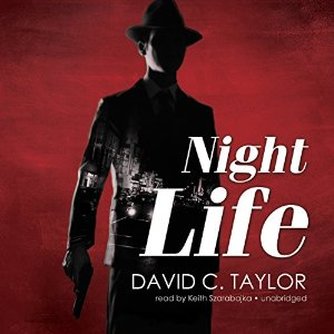 Night Life by David C. Taylor This is the 1st book in a noir mystery series by David C. Taylor. He was a screen writer for years and published this, his first novel, at the age of 70. Michael Cassidy is a cop in 1950's NYC and he finds himself on a case that puts him in too close to the KGB, FBI and the McCarthy hearings. As you would expect, the writing and dialogue is excellent and the story keeps you hooked. I enjoyed this one and see that his second book in the series is available. 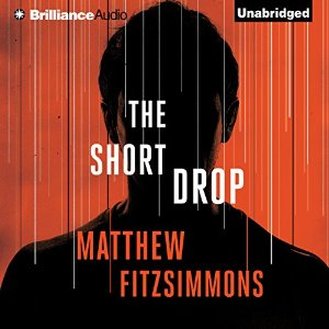 The Short Drop by Matthew Fitzsimmons Hmmmm, what to say about this one. This is a political thriller about a 10 year old case of the missing daughter of the, now, Vice President, Benjamin Lombard. Gibson Vaughn was the son of the Lombard's former chief of staff (until his suicide) and Gibson grew up with Suzanne. After his father's death Gibson hacked into Lombard's political files and ended up convicted and serving out his punishment in the Marines. It's 10 years later and Lombard's former security adviser says there's new information in Suzanne's case. Got all that? It sounds like the basis for a very good thriller and it has great reviews. But I did not like it. Of course the politicians are completely unlikable and I'm grateful to the author for not using this as a political vehicle. You never know which party the VP is aligned with. But I don't know if the story is too contrived, or the characters are completely unlikable across the board, or what my problem was but I almost didn't finish because I just did not care how it ended. I just wanted it over. There's sequel coming out soon. I think I'll skip it. 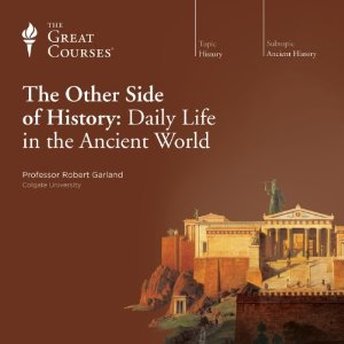 The Other Side of History: Daily Life in the Ancient World by Robert Garland All in all, this was an interesting perspective on history and one we always miss in traditional history lessons. I was really looking forward to hearing about the lives of everyday people in ancient societies. It was presented clearly and covered pre-historic to late middle ages. However, Robert Garland's affected tone got to me after a while. I forgot just how pompous some professors sound. I also got tired of the worn out Beatles references and his blatant liberal comparisons to modern society were unwarranted and, frankly, mistaken. He would have been much better not to editorialize but seemed exceedingly anxious to prove that he is a feminist and stands strong with the modern woman. For example, when talking about women as having no rights or identity he compares it to colonial America implying that it was the last bastion of female inequality. There are plenty of societies with this exact same view of women today and they operate basically the same as they did thousands of years ago. There's no mention of that though. Another example was talking about infanticide in Spartan and other cultures and talking about it as if it was a bad thing. He doesn't mention that this practice was government sanctioned in China not that long ago and all Western cultures willing abort children every day. What makes ours "right" and theirs "wrong"? That would have been a more interesting (and accurate) comparison and discussion if he's so intent on making comparisons. Either both situation are acceptable or they are not. But you can't place shame on the Spartans (they abandoned any babies that were deformed or deemed non-viable for "the good of the community") and not apply the same logic to us who do it for the good of the woman and her choices. He misses some great opportunities to show that we haven't evolved as much as we think but was too focused on bashing modern Western (particularly American) culture. The subject matter was very interesting but it suffered in the telling and editorializing. He should have told it from the contemporary point of view without comparing it to modern civilizations. 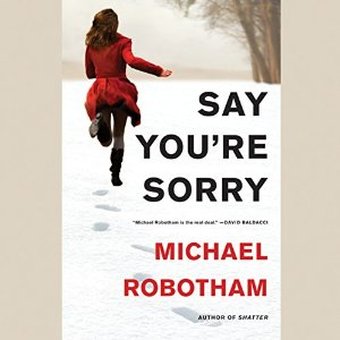 Say You're Sorry by Michael Robotham This is the 6th book in the Joe O'Loughlin series. This series is set in contemporary England and Joe is a clinical psychologist who keeps getting pulled into horrible situations. This one opens with a fire and 2 deaths at a house and the disabled handyman is initially blamed. They bring on Joe to assess the handyman. Meanwhile a dead girl is found in a lake and it's determined that she is one of 2 girls that have been missing for 3 years. I pebbled feverishly throughout this book. In fact, I recommend it for any tedious repetitive work you are doing. It will keep your mind very occupied while your hands do whatever boring task they need to. Plug in this book and you could have every window in your house clean in no time. I couldn't put it down.
I know I read Term Limits ages ago and probably have it on the book shelf as it would have been in my pre-kindle days. I haven't heard of the other books.
Kristin F
7/30/2016 05:27:50 pm
Thanks for the reviews - you write good ones. Re: the vocabulary book - did you mean entomology or etymology? I'm always happy when I see one of your book posts because I know I will discover something I would like to read. This time I'm most intrigued by the first one. I am often suspicious about the so-called 'recycling' efforts that happen here, particularly at places like Tim Horton's. There are bins inside that encourage you to sort items, but how come they are all taken and thrown into the garbage truck and from there to the landfill? Our son worked at a restaurant just beside a Tim's in the city and witnessed it all going in the garbage despite the public being led to believe they were doing a good thing by sorting it out. Makes one wonder just how valid recycling programs really are. Comments are closed.
|
FeedsTo subscribe click the RSS Feed button and copy the URL of that page into your blog reader.
In Bloglovin you need to search "Colorways By Vicki Welsh" to find the blog. About Vicki
I'm Vicki Welsh and I've been making things as long as I can remember. I used to be a garment maker but transitioned to quilts about 20 years ago. Currently I'm into fabric dyeing, quilting, Zentangle, fabric postcards, fused glass and mosaic. I document my adventures here. Categories
All
Archives
July 2024
|
 RSS Feed
RSS Feed